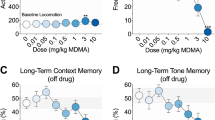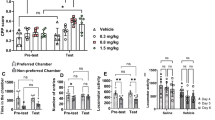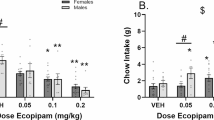Abstract
The present experiment was planned to provide information about relations between behaviorally augmented tolerance and accompanying upregulation of muscarinic receptors (mAChR) (physiological tolerance) in the CNS during chronic administration of the cholinergic antagonist scopolamine. Analyses of the data on mAChR binding established significant upregulation (Bmax) had occurred in the cortex, hippocampus, and striatum of animals treated with scopolamine, but not of those in the saline or methylscopolamine groups. There were no treatment effects in affinity (KD). The effect of scopolamine administered before a behavioral test session was to cause an acute decrease in FR5 responding to water reinforcement, and hence in resulting water consumption. Animals immediately compensated for this decrement by higher response rates during a free drinking (FDR) period which followed. When scopolamine was injected between the FR5 and FDR periods, FR5 responding increased to compensate for the drug's effect on the FDR. There was evidence that physiological tolerance also occurred as indicated by a more slowly developing trend toward recovery of levels of behavioral responding related to mAChR upregulation, although full recovery to pretreatment baselines did not occur within the 25 days of chronic treatments. The results as a whole are consistent with a multifactorial model of tolerance development, to which both behavioral and neurochemical processes contribute.
Similar content being viewed by others
References
Ben-Barak J, Dudai Y (1980) Scopolamine induces an increase in muscarinic receptor level in rat hippocampus. Brain Res 1983:309–313
Bignami G (1979) Methodological problems in the analysis of behavioral tolerance in toxicology. Neurobehav Toxicol 1 (Suppl. 1):179–186
Bohdanecky Z, Jarvik ME (1967) Impairment of one-trial passive avoidance learning in mice by scopolamine, scopolamine methylbromide and physostigmine. Int J Neuropharmacol 6:217–222
Charney NH, Reynolds GS (1965) Development of behavioral compensation to the effects of scopolamine during fixed, interval reinforcement. J Exp Anal Behav 8:183–186
Corfield-Sumner PK, Stolerman IP (1978) Behavioral tolerance. In: Blackman DE, Sanger DJ (eds) Contemporary research in behavioral pharmacology. Plenum Press, New York, pp 391–448
Eckerman DH, Gordon WA, Edwards JD, MacPhail RC, Gage MI (1980) Effects of scopolamine, pentobarbital and amphetamine on radial arm maze performance in the rat. Pharmacol Biochem Behav 12:595–602
Ehlert FJ, Jenden DJ, Ringdahl B (1984) An alkylating derivative of oxotremorine interacts irreversibly with the muscarinic receptor. Life Sci 34:985–991
Ehlert FJ, Kokka N, Fairhurst AS (1980) Altered [3H]quinuclidinylbenzilate binding in the striatum of rats following chronic cholinesterase inhibition with diisopropyl-fluorophosphate. Mol Pharmacol 17:24–30
Gazit A, Silman I, Dudai Y (1979) Administration of an organophosphate causes a decrease in muscarinic receptor levels in rat brain. Brain Res 174:351–356
Glick SD, Zimmerberg B (1971) Comparative learning impairment and amnesia by scopolamine, phencyclidine and ketamine. Psychon Sci 25:165–166
Kalant H, LeBlanc AE, Gibbins RJ (1971) Tolerance to and dependence on some non-opiate psychotropic drugs. Pharmacol Rev 23:135–191
Khavari KA, Russell RW (1969) Depression of drinking by tertiary and quaternary cholinolytic drugs. Physiol Behav 4:461–463
LeBlanc AE, Gibbins RJ, Kalant H (1973) Behavioral augmentation of tolerance to ethanol in the rat. Psychopharmacology 30:117–122
Lowry OH, Rosenbrough NJ, Farr AL, Randall RJ (1951) Protein measurements with the folin phenol reagent. J Biol Chem 193:265–275
Majocha R, Baldessarini RJ (1980) Increased muscarinic receptor binding in rat forebrain after scopolamine. Eur J Pharmacol 67:327–328
Meyers B, Wilchin RC (1969) Some effects of scopolamine on locomotor activity in rats. Psychon Sci 17:174–175
Overstreet DH, Russell RW, Vasquez BJ, Dalglish FW (1974) Involvement of muscarinic and nicotinic receptors in behavioral tolerance to DFP. Pharmacol Biochem Behav 2:45–54
Overstreet DH, Yamamura HI (1979) Receptor alterations and drug tolerance. Life Sci 25:1865–1878
Rosic N, Bokonjic C, Overstreet DH (1980) Task-dependent development of tolerance of scopolamine. Pharmacol Biochem Behav 13:183–186
Russell RW (1982) Cholinergic system in behavior: the search for mechanisms of action. Ann Rev Pharmacol Toxicol 22:435–463
Russell RW, Overstreet DH, Cotman CW, Carson VG, Churchill L, Dalglish FW, Vasquez BJ (1975) Experimental tests of hypotheses about neurochemical mechanisms underlying behavioral tolerance to the anticholinesterase, DFP. J Pharmacol Exp Ther 192:73–85
Sanger DJ (1976) Scopolamine and adjunctive drinking in rats. Psychopharmacology 48:301–309
Scheffe H (1953) A method for judging all contrasts in the analysis of variance. Biometrika 40:87–104
Schiller GD (1979) Reduced binding of [3H] quinuclidinyl benzilate associated with chronically low acetylcholinesterase activity. Life Sci 24:1159–1164
Simon RG, Klein WL (1979) Cholinergic activity regulates muscrarinic receptors in nervous system cultures. Proc Natl Acad Sci USA 76:4141–4145
Suits E, Isaacson RL (1970) Behavioral effects: hippocampal destruction and scopolamine. Psychon Sci 18:9–11
Takeyasu K, Uchida S, Noguchi Y, Fujita N, Saito K, Hata F, Yoshida H (1979) Changes in brain muscarinic acetylcholine receptors and behavioral responses to atropine and apomorphine in chronic atropine-treated rats. Life Sci 25:585–592
Warburton DM, Heise GA (1972) The effects of scopolamine on spatial double alternation in rats. J Comp Physiol Psychol 81:523–532
Yamada S, Isogai M, Okudaira H, Hayashi E (1983) Regional adaptation of muscarinic receptors and choline uptake in brain following repeated administration of diisopropyl fluorophosphate and atropine. Brain Res 268:315–320
Author information
Authors and Affiliations
Rights and permissions
About this article
Cite this article
Russell, R.W., Ehlert, F.J. & Hwa, J.J. Relation between behaviorally augmented tolerance and upregulation of muscarinic receptors in the CNS: Effects of chronic administration of scopolamine. Psychopharmacologia 88, 33–39 (1986). https://doi.org/10.1007/BF00310509
Received:
Revised:
Issue Date:
DOI: https://doi.org/10.1007/BF00310509




